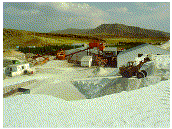 Turkey
has a wealth of industrial minerals. The share of industrial
mineral reserves in Turkey is about 2.5% of the world's
total reserves. Turkey
has a wealth of industrial minerals. The share of industrial
mineral reserves in Turkey is about 2.5% of the world's
total reserves.
Boron Minerals:
Since Turkey possesses two-thirds of the boron reserves in
the world, it has an advantage in marketing boron and its
derivatives. The production of boron minerals is expected to
reach 1.050 million tons. Nearly all boron deposits in
Turkey are operated by Etibank, and Turkey is the world's
second largest boron producer and exporter.
Dimension Stone:
The various types of stone in common use in Turkey are as
follows: marble, granite, limestone, dolomite, basalt,
sandstone, quartzite, slate, tuffs, onyx, travertine,
serpentine and diabase.
In recent years, the use and
production of magmatic original rocks for dimension stone is
greatly increasing in Turkey. The best known varieties of
these stones are granite, syenite, and diabase.
Afyon white, Afyon sugar,
Elazig cherry, Burdur brown, Marmara white, and Denizli
travertine are some important regional varieties having
special colors.
Magnesite:
Turkey produced 1.3 million tons of raw magnesite, 20,000
tons as calcined and 200,000 tons as sintered magnesite in
1994.
Barytes: The
production capacity of crude baryte is 900,000 tons, while
salable production is 300,000 tons.
Pumice: Over
the last years, pumice production has reached 2.150 million
tons. Turkish pumice stone is desired in the raw materials
market to be used in textile washing plants. New
improvements are expected in the product development.
Feldspar:
Turkey has abundant reserves of feldspar in the Manisa,
Bilecik, Balikesir and Kutahya provinces. Mostly sodium
feldspar is produced in these regions. Each ceramic plant in
Turkey has their own quarries to provide the needs of their
factories.
Celestite:
Turkey is a major producer and exporter of celestite. Annual
celestite production capacity in Turkey is about 90,000 tons
per year.
Emery:
Turkey has provided 80% of the world's demand of emery. Most
of the products exported have been used as abrasives.
Trona: There
are many unexploited reserves of soda ash in Turkey.
Accordingly, meetings with foreign investors are being held
to evaluate trona deposits.
Refractory and
Ceramic Clays: Turkey has a strong industry in the
field of ceramic and refractory clays. The main reason for
the development of these sectors is that Turkey has a vast
and diverse reserve of clay minerals.
Turkey is in an advantageous
situation as regards the natural resources of the Central
Asian Turkish Republics. It is recommended that those
companies, who are willing to invest in this area get in
touch with the Turkish companies who are engaged in mining
activity.
|

